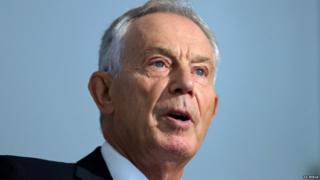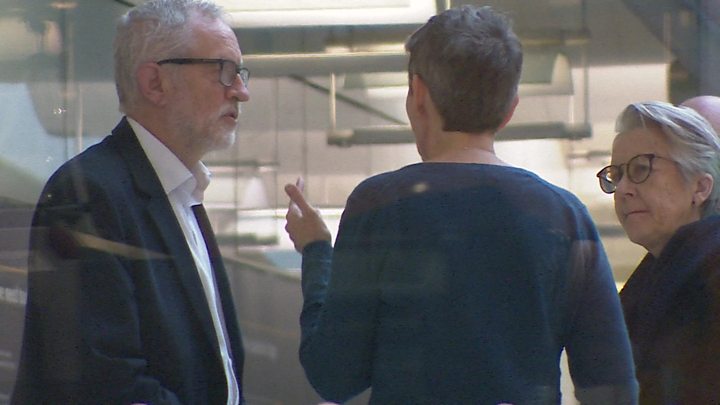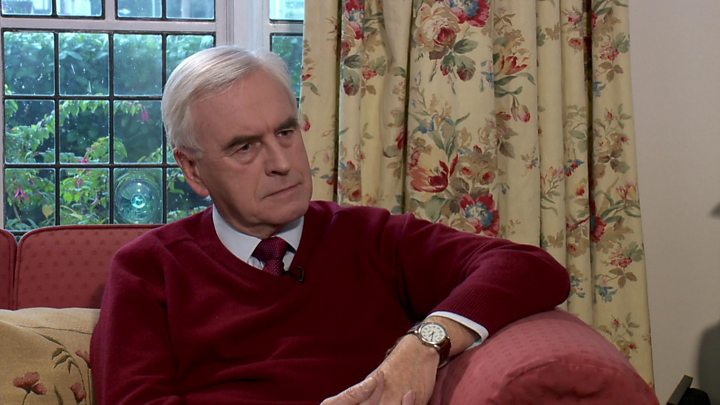[ad_1]

Image copyright
PA Media
Mr Blair said the party must not overlook the “obvious” deficiencies in its offer
Tony Blair is warning that Labour will be “replaced” as a serious political force if it tries to “whitewash” the scale of its election defeat.
The ex-prime minister will unveil research suggesting Labour’s problems go “far deeper” than the unpopularity of Jeremy Corbyn and its Brexit stance.
He will say in a speech that the party faces electoral oblivion unless it changes course.
Mr Corbyn has said he will stand down as leader “early next year”.
At a meeting of Labour MPs on Tuesday, he said he “took responsibility” for Labour’s worst electoral performance, in terms of seats won, since 1935.
But he was criticised to his face by Labour colleagues, former MP Mary Creagh saying the lack of a personal apology showed he was a “man without honour and without shame”.
A number of senior Labour figures, including Keir Starmer and Lisa Nandy, have said they are considering contesting the leadership but none have officially confirmed they are standing yet.
Labour ended up with 59 fewer MPs than two years ago. While its share of the vote, at 32.2%, was higher than in either its 2010 or 2015 defeats, it was a far cry from the 41.9% it secured under Mr Corbyn in 2017.
And the collapse of its so-called “red wall” of seats in the Midlands, the North East of England and the North of Wales – some of which turned blue for the first time in 100 years – marked a watershed moment for the party.
‘Main explanation’
Among the Labour seats to fall to the Conservatives was Mr Blair’s former constituency Sedgefield, which he represented for 24 years, and which has not had a Tory MP since the 1930s.
Mr Blair, who won three general elections in a row between 1997 and 2005, will use a speech in London to warn of an existential threat to Labour.

Media playback is unsupported on your device
He will say that while many Labour voters abandoned the party because of concerns over its Brexit policy – one of the reasons cited by Mr Corbyn and others at the top of the party – the issue was not the “main explanation” for the party’s retreat in so many traditional heartlands.
He will point to research carried out by Deltapoll, for the Tony Blair Institute, which spoke to Labour voters in three marginal seats – Bishop Auckland, Walsall and Bassetlaw – in the final week before the election.
‘Unthinkable losses’
The research, entitled Northern Discomfort, identifies Mr Corbyn’s leadership and the “politics he represents” as the main cause of the “rupture with long-held loyalties” and the alienation felt by many traditional Labour voters.
Other factors it cites for the “unthinkable losses” suffered by Labour were concerns over a lack of economic credibility in its public spending and renationalisation proposals, the leadership’s stance on security issues and a feeling the party had not done enough to root out “extremism”.
Tuesday’s meeting of the parliamentary Labour party lasted for nearly two and half hours – twice its usual length – and only three MPs spoke up for Mr Corbyn.
One veteran MP characterised the meeting as a mixture of “anger, despair and denial”.
The criticisms were wide-ranging, from the direction of the party under Mr Corbyn’s leadership to a shortage of Labour stickers in a marginal seat
The Labour leader himself blamed both the media and Brexit for the defeat.
Labour’s ruling national executive will carry out a formal inquiry but as one former Labour cabinet minister told me “there was a lot of anger but it hasn’t crystallised into a plan of action”.
While the “breach” with working-class voters is not necessarily permanent, the research concludes that the party cannot begin the “long journey” back to government without “discarding the sectarian ultra-left politics that has taken the party over and condemned it to the wilderness of opposition”.
Mr Blair, a longstanding critic of the party’s move to the left under Mr Corbyn, will say the scale and nature of the defeat “marks a moment in history” and demands more than a brief period of introspection and the election of a new leader.
“This election was no ordinary defeat for Labour,” he will say. “The choice for Labour is to renew itself as the serious, progressive, non-Conservative competitor for power in British politics; or retreat from such an ambition, in which case over time it will be replaced.
Internal divisions
“So, at one level, sure let’s have a period of ‘reflection’; but any attempt to whitewash this defeat, pretend it is something other than it is, or the consequence of something other than the obvious, will cause irreparable damage to our relationship with the electorate.”
The defeat has risked turning longstanding internal divisions over Brexit into a wider ideological schism.
Some defeated candidates have blamed senior party figures representing London constituencies, such as Sir Keir Starmer, Emily Thornberry and Diane Abbott. for championing another Brexit referendum and pushing for an openly pro-Remain position.

Media playback is unsupported on your device
Mr Blair has been one of the most vocal advocates of a so-called “People’s Vote” on staying in the EU and warned Labour it was a mistake to agree to a general election before the issue of Brexit had been settled.
Shadow Chancellor John McDonnell, the architect of Labour’s economic plans, has said he “owns” the defeat but insisted that individual policies in the party’s manifesto were popular with many voters.
[ad_2]
Source link

